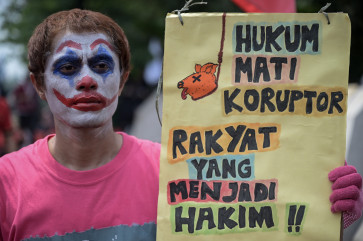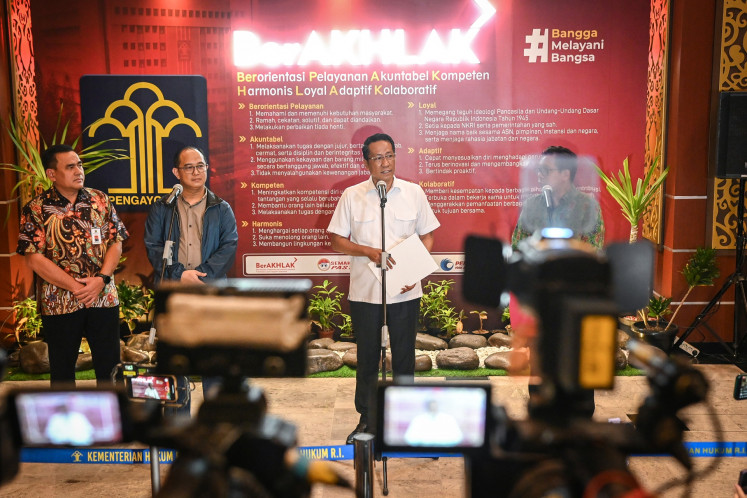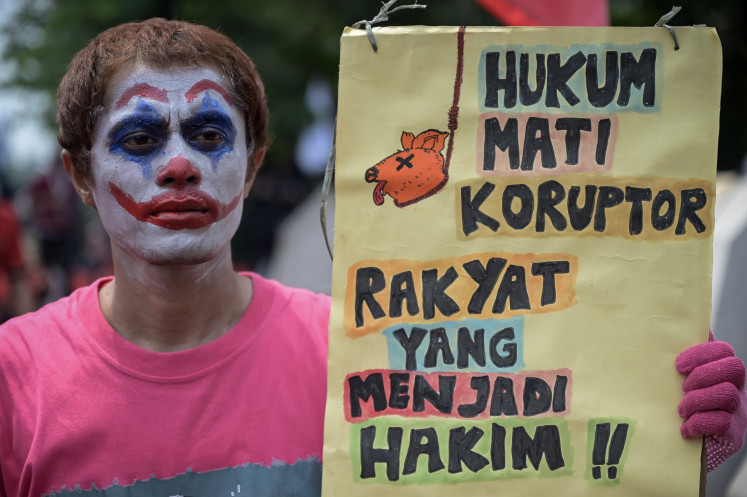Popular Reads
Top Results
Can't find what you're looking for?
View all search resultsPopular Reads
Top Results
Can't find what you're looking for?
View all search resultsThe state’s obligation to protect minorities
The word “minority” is perhaps a well used in Indonesia’s public sphere
Change text size
Gift Premium Articles
to Anyone
T
he word “minority” is perhaps a well used in Indonesia’s public sphere. Despite the fact that, in terms of legal status, we do not recognize the terminology of minorities in our national legal system, such groups of people have existed and lived among our society throughout the history of this nation.
As we are discussing minorities, a question frequently asked would be quo vadis the state’s protection of minority’s rights, as some incidents targeting minority groups remain rampant in the country, such as the recent attack on a Shiite boarding school in Madura and the prolonged dispute relating to the GKI Yasmin congregation. Hence, in my opinion, these phenomena should prompt us to reconsider our perspective regarding the term of minorities.
First of all, let us jump to a clear definition of minority. Francesco Capotorti, the special rapporteur of the United Nations Sub-Commission on Prevention of Discrimination and Protection of Minorities, defines a minority as “a group numerically inferior to the rest of the population of a state, in a non-dominant position, whose members — being nationals of the State — possess ethnic, religious or linguistic characteristics differing from those of the rest of the population and show, if only implicitly, a sense of solidarity, directed towards preserving their culture, traditions, religion or language”.
From such a definition, we may conclude three main criteria that make up a minority group, namely: (i) inferiority in number, (ii) a non-dominant position, and (iii) belonging to a distinct ethnic, religious or linguistic group. Subsequently, we ought to also realize that it is the state’s obligation to protect the rights of people who are part of a minority group.
Article 27 of the International Covenant on Civil and Political Rights (ICCPR), for example, enshrines that, “in those States in which ethnic, religious or linguistic minorities exist, persons belonging to such minorities shall not be denied the right, in communities with the other members of their group, to enjoy their own culture, to profess and practice their own religion, or to use their own language”.
The ICCPR thus likely covers two dimensions of the right holder, namely individual and collective minority rights. Likewise, the Human Rights Committee to the ICCPR opined that, “although the rights protected under article 27 are individual rights, they depend in turn on the ability of the minority group to maintain its culture, language or religion. Accordingly, positive measures by States may also be necessary to protect the identity of a minority and the rights of its members to enjoy and develop their culture and language and to practice their religion, in community with the other members of the group”.
The committee furthers its interpretation that such positive measures must respect the treatment between different minorities and the treatment between the persons belonging to them and the remaining part of the population. Moreover, such measures should importantly be based on reasonable and objective criteria.
In relation to the treatment of minorities, I would also like to pinpoint the Human Rights Committee’s understanding of the right of minorities and the application of the non-discrimination principle, since one might probably argue that such treatment may violate the spirit of equality among citizens.
The committee pointed out that “the principle of equality sometimes requires States parties to take affirmative action in order to diminish or eliminate conditions which cause or help to perpetuate discrimination prohibited by the Covenant ... Such action may involve granting for a time to the part of the population concerned certain preferential treatment in specific matters as compared with the rest of the population”.
By taking the aforementioned arguments into account, it is quite clear that the Shiite boarding school in Madura or the GKI Yasmin congregation in Bogor should be considered minority groups in terms of religious activity. They are obviously inferior in numbers and particularly in non-dominant positions. As a consequence, given the apparent physical and mental threats from certain groups of people, it is thus not merely an equal opportunity that is necessary in this situation, but there has to be special treatment for these groups of people.
Practically speaking, I would argue that there is a need for the state to impose affirmative action in favor of religious minority groups in order to enable them to exercise their rights. This may cover, for instance, a rather lenient precondition and provision for the groups to build places of worship, to conduct religious ceremonies and to profess their beliefs.
Based on the legal understanding, any means taken by the state that can be considered exclusionary to minority rights should be deemed as a legitimate form of human rights protection. As many minority groups are in vulnerable situations, it is proper and timely for the state to take affirmative action in the interest of specific minority groups.
The writer, a Rijksuniver-siteit Groningen alumnus, works at the Human Rights Research and Development Agency, Law and Human Rights Ministry. The opinions expressed are his own.










